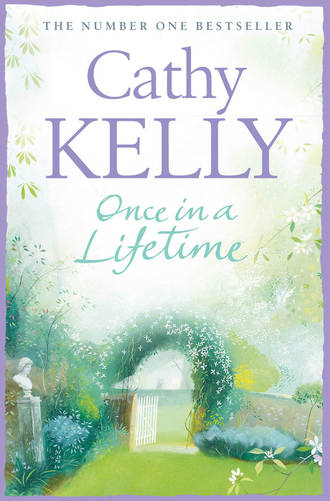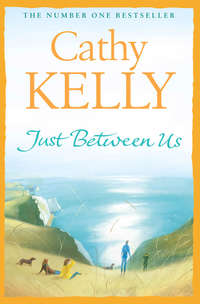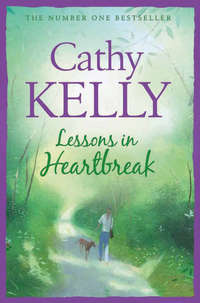
Полная версия
Once in a Lifetime
Meeting Stanley undermined that vow.
‘Why? I thought Kenny’s was doing well?’ Charlie said.
‘Margins, I expect,’ said Shotsy sadly. ‘It’s all about margins. We can’t compete with the likes of DeVere’s on price. They’re buying ten times as much stock as we are, so they get much better deals from retailers. And the supermarkets, the big chemist chains and home-furnishing outlets are hurting us too. We can’t match anyone on price any more. Our saving grace is that we’re a niche store. Take Organic Belle, for example. They’re after exclusivity, it helps them with their brand, but one day some huge conglomerate like L’Oréal will buy them out, and then they’ll go global–world domination in every store. When that happens, we’re in trouble. So, we’re not doing well and the global turndown hasn’t helped. Who has money for luxury nowadays?’
‘This is awful,’ said Charlie.
‘At least we heard about it. Forewarned is forearmed,’ Shotsy said grimly. ‘DeVere’s have their own handbag buyers and they won’t want to hire me. Too many cooks and all that.’
‘You’re brilliant at what you do, Shotsy,’ protested Charlie.
‘Brilliant means nothing. This is hostile takeover time and no matter what sort of flannel they’ll give us about merging the two companies and how the staff will join up seamlessly, it won’t happen, not when DeVere’s and Kenny’s have such different cultures. People like me will be made redundant. End of story, kaput. I wish we could still smoke inside.’
Charlie stood up, got two empty take-away cups and put one in front of Shotsy. ‘Decant your coffee and come out on to the roof. You can smoke and we can talk.’
‘Thought your mother had put you off nicotine for life?’ said Shotsy, pouring her espresso into the take-away cup.
Shotsy was one of the few people who seemed to understand that Charlie’s mother wasn’t quite the loveable revolutionary glamourpuss she pretended to be.
‘Tough growing up with a mother like that,’ she’d said shrewdly on their first meeting, an event in the shop. ‘She has very strong opinions on everything, your mother.’
Charlie sent her a grateful look. Shotsy wasn’t a member of the Kitty Nelson fan club, won over by the purred ‘dahling’s and the war cry that she’d let her daughters live their lives their own way because it was wrong to inflict archaic moral codes upon them.
‘I can’t stand the smell of smoke,’ said Charlie now, ‘but I need to hear everything and you need cigarettes to get your brain working.’
The roof terrace was far less glamorous than it sounded–a flat area of the store’s roof, surrounded on all sides by slanting mountains of tile. To get there, the women had to climb the back stairs that led past accounts and credit control.
Finally, Charlie pushed the old metal door open and they emerged, panting, into the cool February sunlight. Charlie shivered without a jacket but still waited until Shotsy had a couple of decent drags on her cigarette inside her before asking: ‘What do we do?’
‘Keep our eyes and ears open, and wait,’ said Shotsy.
‘That’s it: wait?’
‘Nothing else we can do. We’re just the worker bees.’
Charlie wrapped her arms around herself to ward off the cold. ‘If DeVere’s buy us, they mightn’t make radical changes,’ she said hopefully. ‘If it’s not broken, don’t fix it, right?’ She thought how much she loved her job; and she was good at it, too. Shotsy was brilliant as an accessories buyer; she understood that women who could never afford to dress head-to-toe in designer clothes still loved having the designer glamour that went with an expensive handbag or a pair of designer sunglasses. How could DeVere’s belittle what the Kenny’s staff had to offer?
‘It mightn’t be broken,’ Shotsy said, stabbing out her cigarette, ‘but they’ll still want to fix it so that Kenny’s isn’t Kenny’s any more. It will become DeVere’s. Branding,’ she added in a low voice, ‘that’s what it’s all about now. People like me are part of the Kenny’s brand, and we just wouldn’t fit the DeVere’s brand. There’s no reason they won’t keep you, though, Charlie.’
‘Except for one thing,’ Charlie pointed out. A horrible idea had just occurred to her. ‘DeVere’s don’t stock Organic Belle. It’s like what you said a moment ago: Organic Belle wanted to keep their brand exclusive, so Kenny’s is the only stockist on the east coast. There’s us and Pathologie in Galway, and then the three Organic Belle shops in Cork and Kerry. And now Harrods. That’s it. I’m sure DeVere’s were furious they couldn’t get it. What if they decide not to stock it out of pique, just to make a point? Or if the Organic Belle people pulled out? What then? I’m out of a job.’
‘There’s making a point and there’s doing business,’ Shotsy said. ‘They’re not stupid.’
‘Getting rid of you would be stupid, but you’re sure they’d do it,’ Charlie retorted.
‘Let’s hold off worrying until we know what’s happening.’ Shotsy rearranged her platinum hair and opened the door to the fifth floor. ‘Just keep your eyes and ears peeled. After all, David’s a good man. He wouldn’t sell out without looking after all of us, would he?’
She didn’t say it with conviction, Charlie thought. David Kenny was a good man and he did look after his staff. But if he needed to sell the department store for some reason, perhaps he mightn’t be able to look after them quite as well as he had in the past.
The rest of the afternoon on the cosmetics floor was mercifully busy so Charlie didn’t have a moment to brood. There were three women who worked in the Organic Belle department and Charlie was always the most popular both with newcomers to the range and with long-standing customers coming back for more. She had a kind of empathy that allowed her to understand how someone could feel nervous walking into an elegant department store and facing the beautifully made-up women behind the counters.
Part of her attraction was that she didn’t fit the traditional vision of stunning beauty usually found manning the counters in cosmetics departments. Yes, her subtle make-up was beautifully applied, thanks to the courses she’d taken when she signed up with Organic Belle in the first place, but she chose never to look too glamorous or inaccessible.
Charlie was petite with a curvy figure, shiny chestnut hair that she wore in a groomed ponytail, a round, smiling face with neat features, and slightly cat-shaped eyes inherited from her mother. However, she didn’t have her mother’s fine-boned face or the fabulous lips that Kitty Nelson painted various shades of red: pillar box, fire engine, crimson. And she’d missed out on the long, elegant legs her mother and sister liked to show off with their high heels, sheer stockings and lashings of attitude.
What she did have was a friendliness that drew people to her.
Her husband was constantly trying to make her understand how important that was, and how long legs, sultry lips and a hand-span waist couldn’t hold a candle to innate kindness.
‘You light up a room when you smile, do you know that?’ he would say to her.
‘Stop it, Brendan!’ Charlie would laugh, and kiss him. But she loved him saying it. She hadn’t known such kindness since her father left.
Growing up with her mother and sister, two fiercely strong personalities, Charlie had often felt like a plump little mouse who’d snuck into the lions’ cage. The lions ensnared people with their glamour and ferocity, and nobody could quite believe that Charlie, who listened far more than she talked, could possibly be related to Kitty and Iseult.
Her champion had been her father, who was just as capable of being the egotistical big cat as his wife and older daughter, but who adored his little Charlotte.
And then one terrible day, when Charlie was fifteen and Iseult was eighteen, he’d packed his bags and left.
‘I’m not leaving you, Charlotte,’ Anthony Nelson told her, extracting tissue after tissue from the box to wipe away Charlie’s tears. ‘I love you, remember that.’
‘But you are leaving,’ Charlie had sobbed.
‘I can’t live with your mother any more, that’s all, Charlotte. I can’t. Lord knows, I’ve tried but she’s destroying me–’ He collected himself. ‘Grown-ups sometimes leave each other, but that doesn’t mean they leave their children. I love you and Iseult. That will never change.’
‘Can I come with you?’
He looked shocked. ‘Kids don’t live with their fathers, Charlotte. They live with their mothers, you know that.’
‘Do they have to?’ she whispered. If her mother heard, she’d explode with anger. The volume of screaming in the house had already been dangerously high for the past hour. It was only quiet now because Kitty had slammed the door to the sitting room and was in there with ‘It’s Too Late’ playing over and over on the stereo, almost drowning out the clinking of the gin bottle. But if she’d crept out and was secretly listening to what Charlie had said, she’d be furious…
‘I will never say anything bad about your mother to you, Charlotte,’ her father said urgently, holding her hands in his. ‘She loves you both and, Lord knows, your mother has enough passion in her, so when she loves, she really loves. I hate men who try to discredit their wives when they split up. Your mother is an amazing woman; look at all she’s done, look at what she does for you.’
Charlie thought of her friend Suzy, whose mum would sit on her bed at night and ask about her day, then she would tell Suzy how much she loved her and how proud she was of her. Charlie would have liked that, but it wasn’t the sort of thing Mum did. Plus, Mum despised Suzy’s mother.
‘The woman’s a nightmare! I don’t know why you have to pal up with Suzy. She’s such a milk-and-water child. Oh, I give in. Go to her house, if you must–but when I come to pick you up, be waiting at the gate for me. I refuse to be subjected to her drivel about how fabulous Suzy is and how they’re all going camping or something ghastly for their holidays. Who the hell goes camping? Well, we girls camped that time in Paris–but that was different. We were part of the Women and Power demo, and we were broke.’ There followed a litany of fun had at the time, including a night in Montmartre with a man who chain-smoked Gauloises and said he was going to sculpt her in his version of Marianne, because she was the Celtic Marianne. And oh, there was a fabulous dress shop in a backstreet in the Marais where Kitty had bought a second-hand Schiaparelli dress that everyone just adored. Men dropped like flies when they saw it. Simply dropped.
‘Your mother sacrificed a lot for you girls,’ Dad continued. ‘Don’t forget that. She’d be devastated if she didn’t have you. I wouldn’t dream of doing that to her.’
He seemed lost in thought for a moment, and Charlie could tell he was thinking how ungrateful she was. He was right, her mother must be wonderful, really. Children didn’t leave their mothers. That was a sin. Being a mother was hard, and if a mother screamed sometimes, it was because she had kids who drove her to it. So Charlie was a bad person for even thinking of leaving her mother.
She looked at her father and saw his eyes were wet. Just then, she felt a bit of her curl up and die. She’d revealed something bad to her darling dad and he was upset with her. She felt so ashamed.
‘I love you, Charlotte,’ he said as he left.
Charlie had nodded and said nothing. She daren’t, in case she started to cry. Telling the truth couldn’t be good when what you felt inside was so bad.
When she was twenty-four, she’d met Brendan and he’d changed everything. He’d made her feel treasured and special. From their first meeting, she’d known he was the love of her life. Accustomed to her mercurial home where tension ratcheted up and down at speed, spending time with Brendan made her see that people could be calm and kind to each other. Nobody in Brendan’s home screamed at anyone else because they were randomly in a bad mood.
Six months after meeting, they moved in together. A year later, they were married.
‘You’re throwing yourself away,’ her mother had said furiously. ‘He’s only a bank clerk. He’ll never amount to anything.’
But it’s not his job to amount to something on my behalf, Charlie had thought but never said. Surely that was the very tenet of her mother’s much-vaunted campaigning: there was no use pretending to be Cinderella and waiting for the prince to arrive. You had to be your own prince.
She had a good job in the phone company. Together, she and Brendan had enough money to put a deposit on a house. Together they could do it. Now her mother was saying that together wasn’t the key: Brendan had to be able to support the pair of them all on his own for it to count.
She’d given up work when Mikey was born, another bombshell.
‘You can’t give up work now! What’s wrong with using a crèche?’ demanded Kitty.
‘It’s expensive. I’d be going to work purely to pay for the crèche, and paying the crèche so I could work. It’s a vicious circle. We’ve decided that I’ll stay at home until Mikey goes to school, that’s all.’
‘Your career will be ruined! Have I taught you nothing!’
As it turned out, Charlie’s career hadn’t been ruined, though when Mikey had started going to school, she’d looked for work with more than a little trepidation. After all, who would want to employ her? When the phone company told her they had no vacancies, it seemed her mother had been right. But Organic Belle, a fledgling company, was willing to take her on. It transpired that Charlie had a gift when it came to selling cosmetics. She had done so well that a year ago they’d appointed her supervisor for the Organic Belle range, which meant more money and more responsibility. Charlie loved her new role.
Brendan, too, had moved up the promotion ladder, but the bank had yet to make him a manager, which was about the only job his mother-in-law would have respected.
Mikey was the centre of their lives. As he grew, Charlie grew too, realising that while she wasn’t precisely the high-performing career woman her mother desperately wanted her to be, she was the most special person in the world for one little boy and for his father, and actually, that was all that mattered.
Motherhood taught her to trust her instincts. And it taught her another lesson she’d quite like not to have learned: that there were many ways to be a mother and that letting children feel their mother had sacrificed her fabulous life for them was probably not top of the list. That thought simmered away in the recesses of her brain. A person could be wonderful at one thing, say campaigning for women’s rights, and yet be hopeless at another, like being a kind and caring mother.
There was no law to say a person had to be both. One was enough. But understanding one’s own abilities in these areas was a vital part of life. Charlie had been raised to the independent woman ideal but had found that parenting was the career that fulfilled her most. What hurt was having her mother treat this important part of Charlie’s life with such disdain.
When there was a lull in business, Charlie took a moment to ask Karen, the woman she was training, how she was getting on. Charlie enjoyed working with trainees: there was a buzz from being with someone learning about Organic Belle, particularly when they were doing as she’d done and rejoining the workforce after having children.
Karen was forty and still very anxious about her new job, even though she’d worked as a personal assistant to a high-powered businessman before she’d left to have children.
‘That was then, this is now,’ she said to Charlie. ‘Ten years is a long time to be out of the workforce. I feel like I’m masquerading as a person with a job. I half expect customers to tell me to get out from behind the counter and fetch a real salesperson to help them.’
‘You’re great at this,’ Charlie said. ‘You’re good with people too. I felt the same when I started; I was just as nervous.’
‘That’s very kind of you, Charlie, but you’re only saying that,’ said Karen, still anxious. ‘There’s no way you were nervous. Look at you: you’re so calm and professional about this. I’ll never be like you.’
‘Trust me,’ Charlie said, ‘I was just as nervous. If you don’t believe yourself, Karen, believe me, and I’m telling you that you’re well able to do this.’
When Karen had gone to serve a customer, it struck Charlie as strange that the people who worked with her thought she was calm and professional, while her mother thought she was dithery and unambitious. It was the family box syndrome: your family put you in a certain compartment when you were small and, once you were in it, you weren’t supposed to leave–not in their minds, anyhow.
Charlie had been stuck in the quiet, will never make anything of herself box, and that’s where she was supposed to stay.
Well, now she’d decided she wasn’t staying in any box, for anyone.
Today was her late shift at work, which meant Brendan would pick Mikey up from his friend’s house at six and together they’d make dinner. Brendan was teaching Mikey to cook and they were slowly working their way through a Jamie Oliver book. In fact, Mikey showed great flair for cooking and was improving at such speed, he’d soon be better than his dad.
‘Dad, like this–’ Mikey had said the night before, taking one of the sharp knives and cutting a courgette slowly but expertly. ‘You do them all sideways. They’re supposed to be straight, all the same.’ Mikey was dark like his father, with big hazel eyes and spiky hair that fell over his forehead as he worked. His tongue stuck out a little as he concentrated on slicing the courgettes, and that, combined with the intensity on his young freckled face, made Charlie’s heart contract. He was growing up so fast.
‘When you get your restaurant, we’ll go there every night,’ Brendan said proudly.
‘If you do,’ replied Mikey, still busy chopping, ‘you’ll have to pay like everyone else. I have to make money!’
‘Right then, we’ll join the huge queues waiting to get in,’ Charlie suggested.
Mikey considered this. ‘No, it’s all right, you can skip the queue.’
‘Why?’ demanded Charlie, ruffling his hair. ‘Because we’ll be too old and wrinkly and will ruin the look of the place?’
Mikey giggled, a big smile creasing up his face and making his eyes dance. ‘No. OK, you can eat for free.’
‘Same deal as here, then,’ his mother laughed. ‘Everyone eats for free.’
They were making a beef stew tonight and Charlie was looking forward to it. To add to the whole thing, she’d bought some apple struedel in the food hall and there was cream in the fridge. No matter how enormous the main course, Brendan and Mikey were always like wolves for dessert. Mikey had shot up in the past year, was nearly as tall as his father, and could eat to Olympic standard and still remain lanky.
It was after seven when she reached her car, a battered Citroën she was passionately attached to despite its decrepitude. Throwing her bag in, she switched on the heater to take the February chill from the air, and then phoned home.
‘Hi, love,’ she said as Brendan answered. ‘How was your day?’
‘Hello, Charlie. Oh, you know: the usual. It’s over, that’s the thing. How was yours?’
Charlie thought of the news Shotsy had imparted. She usually told Brendan everything–well, almost everything. She lied by omission sometimes when it came to her mother because Brendan wouldn’t stand for some of the things Kitty said. But tonight, she didn’t want to ruin their evening telling him about DeVere’s. She’d tell him tomorrow or at the weekend, perhaps. ‘Fine,’ she replied. ‘Has Chef started?’
‘Braising beef as we speak.’
‘He’s amazing,’ she said in wonder. She knew so many people with teenage sons who talked about them as if they were juvenile delinquents-in-waiting, and here she and Brendan had this wonderful son who cooked them dinner once a week. Sure, he grumbled sometimes, and left smelly socks and cycling kit all over his room and was totally deaf when he was at his PlayStation, but he never shouted that nobody understood him or told his parents he hated them, which was apparently the norm. Charlie felt so lucky when she thought about her beloved Mikey. ‘I didn’t know how to braise beef when I was thirteen,’ Brendan said.
‘Nor me,’ Charlie agreed. Hardly a surprise, she thought, given that cooking wasn’t at a premium in the Nelson household. ‘And I may never have to again, now that Mikey’s doing it all the time.’
‘He’s better at cooking than both of us,’ Brendan added ruefully. ‘Did you get anything for dessert?’
‘You only love me because I work beside Kenny’s food hall,’ Charlie teased.
‘Is that a yes?’
‘Yes, greedy guts. I love you.’
‘Love you too. You’re on your way?’
‘Yes, just leaving.’
‘Drive carefully.’
Charlie hung up and then deleted the missed call symbol on her phone. Her mother had phoned twice. Once at five minutes to three and again half an hour later. Staff on the floor at Kenny’s weren’t supposed to have their mobile phones on their person during working hours unless there was a specific reason for it. So Charlie, along with most people, left hers in her locker with her bag. Brendan, Mikey, and Mikey’s school all had the direct line into the Organic Belle department, and could reach her in any emergency. The only person, therefore, who left urgent messages on her mobile was her mother.
‘I’m at the doctor’s surgery, in the waiting room. I felt faint and I got a taxi to take me. There’s a long queue, mind you. But I’m sure Dr Flannery will see me quickly. He knows my heart’s not good, and that’s more serious than what’s wrong with most of the people here. Call me when you have time. I may need a lift home.’
Charlie felt the familiar tightening of her temples that foretold a massive tension headache and wondered if she had any ibuprofen in her handbag. Only her mother could leave such a message, dismissing everyone else’s ailments as nothing compared to hers, with the entire surgery waiting room listening.
The second message was more succinct:
Dr Flannery wants to do cholesterol tests on me. He’s worried. So am I. I knew this morning that something wasn’t right. I’ll be at home if you can spare the time to phone.
Charlie clicked off, then switched the phone off totally. Was that what Shotsy meant when she said ‘detach with love’? Charlie wasn’t sure. Between the news about DeVere’s and her mother’s double volley at both ends of the day, Charlie felt wrung out. She wanted to go home, eat dinner with her darling family and not talk to anyone else. What she didn’t want was to be at the beck and call of her mother. Was that too much to ask?
4
When you’re annoyed, don’t speak from that place inside yourself that nurtures all past hurts. That will just make it all worse.
Friday was Valentine’s Day. Passing a man carrying a big bouquet of red roses on her way to work, Ingrid thought of her daughter getting ready to go to Lizzie’s wedding. At the television studios, the security guard on reception was hauling a big bag of fan mail with red envelopes spilling out of the top, through the inner security doors to the offices.
‘Valentines for Ken Devlin?’ she asked.
‘Don’t know what they see in him,’ muttered the guard, panting. ‘He’s got a face like a robber’s dog. And he’s a midget, you know. Five foot two is all. A midget. Looks taller on television, of course.’
Ingrid nodded noncommittally, thinking of Marcella. One person’s midget might be another person’s love god.
It seemed there was no escaping St Valentine, even in the office. The Politics Tonight team was divided into two camps: those who thought Valentine’s Day was a ruthless marketing ploy by flower shops and card-makers, and those who saw it as an expression of pure romance to have love declared in public with the gift of flowers or chocolates.
Ingrid found that where people stood on the matter largely depended on their current experience with the opposite sex. Martin, one of the producers, was in the throes of a vicious divorce and was muttering grimly about having been nearly knocked off his racing bike on his way into work by a fleet of flower delivery vans.








